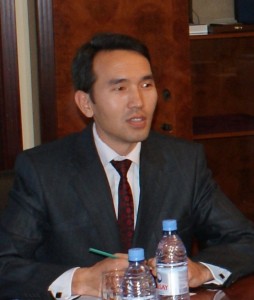 The Syrian Civil War, the ongoing armed conflict in Syria between forces loyal to the Ba’th government and those seeking to oust it, is nearing its third year carrying multiple dimensions of violence, including sectarian and ethnic violence and global terrorism.
The Syrian Civil War, the ongoing armed conflict in Syria between forces loyal to the Ba’th government and those seeking to oust it, is nearing its third year carrying multiple dimensions of violence, including sectarian and ethnic violence and global terrorism.
What was called in the West the Arab Spring came to Syria as an Arab Winter, leaving thousands dead and making millions refugees. Today, the historically rich country and the centre of the Umayyad Caliphate that controlled a third of the world in the Middle Ages has become a war-torn country, lagging economically behind its neighbours. Syria has a special place in the hearts of the Kazakh people, whose great sons Al-Farabi and Beibars are buried in Damascus.
Its globally strategic position has never allowed Syria the chance to resolve its internal conflict through political dialogue. Its location on the Mediterranean Sea, a potential transit route for liquid gas as well as a connecting point for Sunni Muslim radicals, combined with the volatile security situations in many of its neighbours, created a scenario in which global and regional powers felt it necessary to intervene in the conflict.
World powers with an interest in the Syrian conflict took firm positions, as if taking a last stand. The supporters of the Arab Spring managed the conflict to fit their interests. Now the Syrian people as well as other peoples of the region are paying for this multidimensional conflict of geopolitical, strategic and economic interests.
The only hope is the Geneva II Conference on Syria, during which both sides of the conflict can negotiate to implement the Geneva Communique, which calls for a transitional governing body. I hope the optimistic statement of the spokesperson for UN Secretary General Ban Ki-moon proves correct when it says “it aims to bring two broadly representative and credible delegations of the Syrian government and opposition to a negotiating table in order to end the conflict and launch a political transition process through the full implementation of the Geneva Communique of 30 June 2012.”
Unfortunately, these negotiations lack a full and real representation of the two sides. The opposition especially cannot be fully called in to this process. Even if they persuade the Western-backed Syrian Free Army to implement the communique, they will face the Islamic Front and Al-Qaeda loyal Jabhat Nusra, who are also members of the opposition. Here, there is a risk of repeating the long conflict in Afghanistan, creating a conflict between fundamentalism and liberalism and creating the conditions for lingering sectarian and ethnic rivalry. Rebel groups who want to implement Sharia law in Syria may start to fight any transitional government, creating an enclave inside the country to host global terrorism. That’s what Al-Qaeda leader Aiman Zawahiri meant by using this opportunity to call rebel groups to unite after the Islamic Front started to fight another affiliate of Al-Qaeda, the Islamic State of Iraq and Levant. This is yet more fuel to ignite global terrorism.
There is another dimension of this conflict that is hard to stop through political dialogue: sectarian violence. The Syrian Civil War has leaked into neighbouring Iraq and Lebanon in the form of sectarian violence. This conflict needs the involvement of neighbouring countries, and its resolution depends on the internal political dialogue in Iraq and Lebanon as well as among religious leaders and clerks in the region. Iraq suffered sectarian violence, while Lebanon had a civil war.
The issue of the Kurds is yet another transnational problem within the Syrian conflict. Today, Syrian Kurds have formed armed groups inside Syria. Even if they have never declared separatist intentions, they could cause serious cross-border problems if they were not satisfied by the transitional government.
What we have learned from conflicts in the Middle East and especially from the Syrian Civil War is that Kazakhstan’s national leader Nursultan Nazarbayev’s global and regional initiatives, starting from confidence-building measures and extending to fostering dialogue among religions, were really necessary for stability in the region. The resource-rich countries of the Middle East must invest their human energy into social and economic development instead of being victims of the geopolitical games played by regional and global powers.
The author is a chief expert at the Centre of Military and Strategic Research in Astana.

